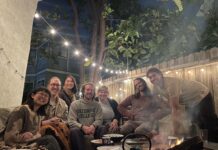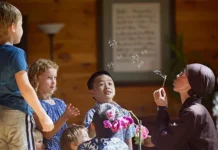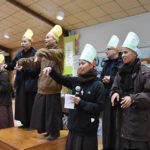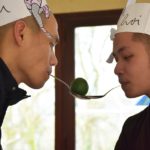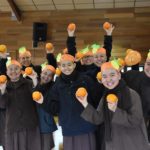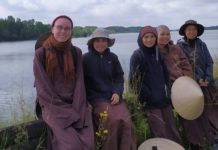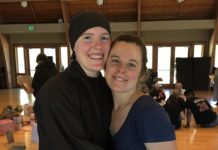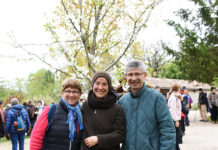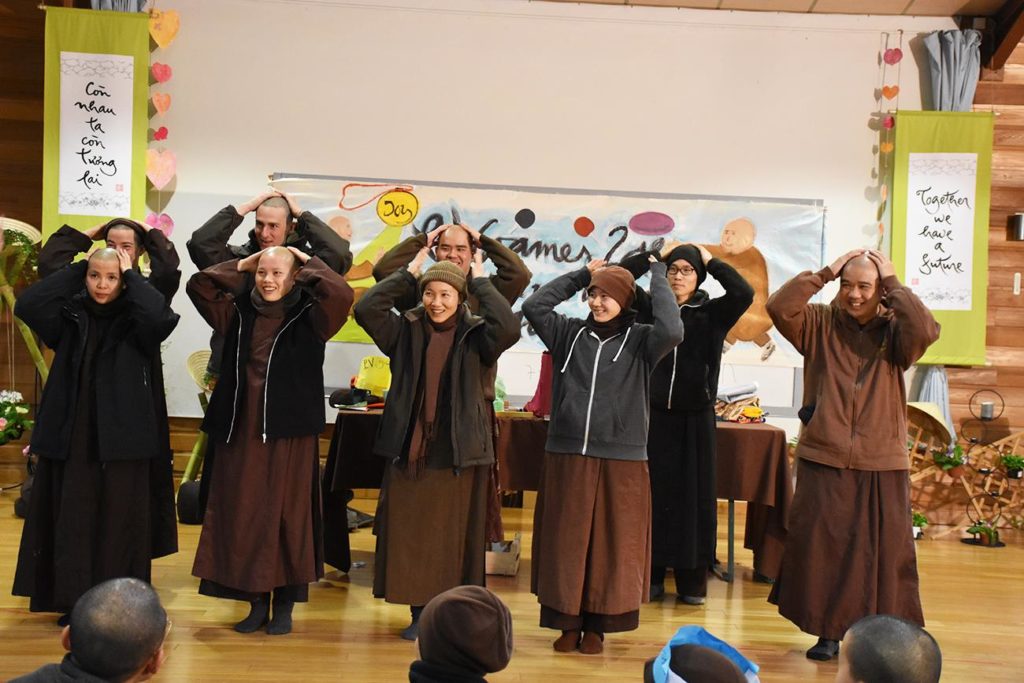
By Brother Warman
As a young people, I like to play. I lost my playfulness, but now I’ve regained my joy and playfulness. The suffering I encountered in my life robbed my playfulness. My father passed away several months before I ordained as a monk. The difficulties I encountered as a social worker and Order of Interbeing member robbed a lot of my joy and happiness. In the beginning when I arrived at Plum Village, I didn’t talk and play much. I just focused on my practice to heal the wounds inside myself.
I’ve read many of Thay’s books and listened to many of his Dharma talks to heal myself. I read many Mahayana sutras and its commentaries by Thay. I faced a situation when I was like flying in the sky, and I forgot how to stay grounded on the earth. This is the situation Thay described when we learn Mahayana sutras, but we don’t have a solid ground of the basic practice. I felt very lucky that I discovered this teaching, and it guided me to fly back down to the earth. My mentor and my friends on the path in Plum Village helped me to be more down to earth. They encouraged me to share more in Dharma sharings. My mentor said to me if I can transform my wounds, I can share the living insight on how I can transform myself for the monastic and lay Sangha through Dharma sharing.
It helped me to change my perception that play is actually for everyone.
At first, I thought play as one of the four elements (study, practice, work, and play) in the Plum Village tradition for only young monks and nuns. Even though I’m still young, I was very serious and determined to heal my wounds with the practice and study, and forgot how to play. During the monastic retreat, I had a chance to watch the performances of my brothers and sisters. Many of my elder brothers and sisters danced. I still remember Sr. Chan Duc (Sr. Annabel) and Sr. Dieu Nghiem (Sr. Jina) dancing. On another occasion, I saw Br. Phap Ung dancing when he gave a Dharma talk. I deeply admired their practice, but then I admired their playfulness. It helped me to change my perception that play is actually for everyone. My mentor Br. Phap Luu invited me to dance ballet for the Lunar New Year’s Eve Performance last year. I danced ballet with him and some of the Son Ha brothers.
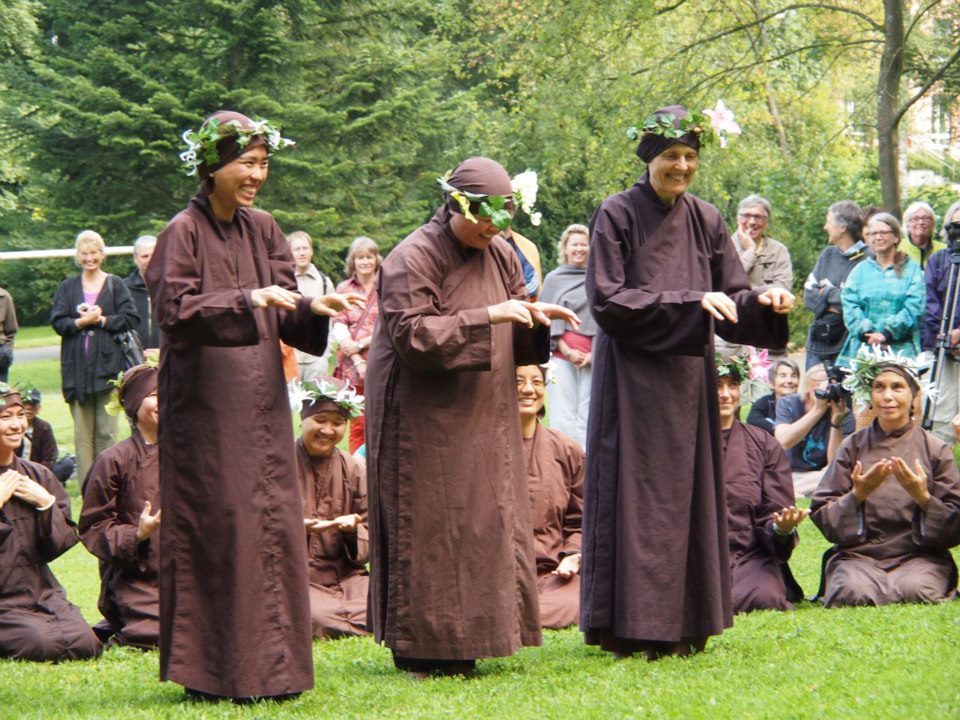
Just by observing Thay, I could see that Thay also likes to play. I had the impression that as a Zen Master, Thay should be serious and stern. But Thay often smiled and made jokes during the Dharma talks that everyone laughed. When Thay got sick and sometimes joined walking meditation with the Sangha, Thay picked up a leaf, smiled, and then with a bit of playful gesture made everyone laugh.
Thay gave guidance on “Reflection on the Practice,” in terms of the four elements in Plum Village tradition for the monastics. Three questions really helped me to learn more about play. The first question is “When does play nourish my practice?” It helps me to see that play is an element of the practice, and practice is also an element of play. They are interconnected. I learned that play is not necessary to be separated with the practice. When we play soccer, ping-pong, hiking, or go to a beach or a mountain, it’s also a practice. By doing sports or exercise, it helps me to release the tension in my body and by doing it together it nourishes the togetherness, brotherhood, and sisterhood.
When the brotherhood and sisterhood is strong, we can play with each other, and it nourishes my practice.
Before I ordained, I was very strict with watching movies. In fact, before I knew the practice, I watched a lot of movies and listened to many songs. But slowly I saw that not many movies and songs are wholesome. Many of them have watered the seeds of anger, hatred, and loneliness in myself. I tried to run away from my suffering by watching movies and singing songs, and they didn’t help me to transform the unwholesome seeds. It just made the seeds become bigger. After I knew the practice, I became more selective in watching movies. I just watched movies some people recommended to me. Many of the cartoon movies are very wholesome and have good moral lessons. I watched many movies with my Wake Up Sangha in Bogor. I remember we watched Frozen, and it shows that cartoon movies now are not only talking about romantic love between prince and princess just like in a fairy tale, but also love between sisters. This is a kind of love available in the monastery, especially in Plum Village. We call it brotherhood and sisterhood.
The second question is “Play and brotherhood/sisterhood – how do they complement each other?” I see play as a tool to connect with one another. Many people ask the Indonesian brothers and sisters why we can be so happy. The answer is because we know how to play. Every time we gather, we share a lot of funny stories and laugh and laugh. Sometimes the other brothers and sisters join us, and we are always open to welcome them. Sometimes we translate our jokes into English so that they could understand, even though sometimes it doesn’t work! I learnedthat the togetherness we have as brothers and sisters is very important in my spiritual life. Sometimes we have formal or informal sharings, and I could see that we are all have a deep aspiration to deepen our practice, not only just to play. To me, play is a ground to build brotherhood and sisterhood. When the brotherhood and sisterhood is strong, we can play with each other, and it nourishes my practice. In this way, they complement each other.
The third question is “How can we practice not to lose ourselves in amusements?” This is a question that helps me a lot to not to play too much. It’s good if I know how to play, but the next step I need to learn is to play in moderation. I know if I talk too much and make jokes too much, I can lose myself easily. I used to do it before I knew the practice, and I knew that sometimes it could hurt others. So I decided not to talk too much even though in the beginning it was quite extreme. But it really helped me not to hurt others.
It’s good if I know how to play, but the next step I need to learn is to play in moderation.
Slowly and slowly, I learned to talk and make jokes again. I felt I was like a baby just born in a spiritual life. It took me some years to learn how to talk and play again but more mindfully and joyfully. In the beginning of my monastic life, I decided not to engage in idle talk, as it is recommended in the book Stepping Into Freedom, in the “Encouraging Words” section by Master Gui Shan. It says, “When you finish eating, if you sit around talking idly, it will increase everyone’s suffering later on.” Then I see that people in our time are more suffering if they don’t talk after they have finished eating. It created a feeling of isolation and loneliness.
I begin to understand what Thay often said that loneliness is the sickness of our time. Slowly I see that idle talk is not so bad as I thought. It helps me to connect more with other people. Sometimes I suffer because of my own perception of what other people may think of me. But after I have found out what they didn’t think of me like I thought, I felt happy. I see that idle talk sometimes is necessary but not too much. The important thing is not to lose myself in amusements of conversations.
My practice of selective watering is to choose songs, films, and games that can’t damage my body and mind.
Sometimes, I play games with the brothers and sisters. In a retreat with the young people, we played a lot of games. It helped us to get to know each other in a fun way and also nourished our joy and happiness. Recently, I played hide and seek with some brothers in Son Ha. I fell into a puddle and it made my clothes muddy, but I still enjoyed hiding. I felt it nourished my inner child within myself. The seventh precept of novices on not being caught in worldly amusements says:
“Aware that many songs, films, books, amusements, and games can damage body and mind and waste precious time that could be used for study and practice, I am determined not to be drowned in these distractions. I am determined not to read novels, look at worldly films or books, or seek distraction by singing or listening to love songs or other kinds of music that cause negative emotions to arise. I will not waste time playing electronic games or gambling.”
My practice of selective watering is to choose songs, films, and games that can’t damage my body and mind. Now I only listen to Plum Village songs, some Buddhist songs, and some worldly songs that I know the lyrics are wholesome. In Plum Village we are very careful in choosing wholesome songs and sometimes we make up the lyrics to become more wholesome ones. Sometimes when the brothers ask me to play, I have to say no if I have played too much.
I enjoy writing, reading books, drinking tea, sitting, and walking when I have free time. I know that when I do it with joy, I have actually played. When I walk and I enjoy every step I make, it’s a kind of play. I play with my inner child within myself by embracing him with my steps and breathing. I remember Sister Chan Duc shared that Thay used to say “Di choi” in Vietnamese before giving the Dharma talk, which means, “Let’s play.” But she shared that it’s better to translate into English as “Let’s go with enjoyment.” or “Come and enjoy walking with Thay.” It helps me to see that play is a matter of enjoyment. If I am studying, practicing, and working with enjoyment, actually I’m playing at the same time.
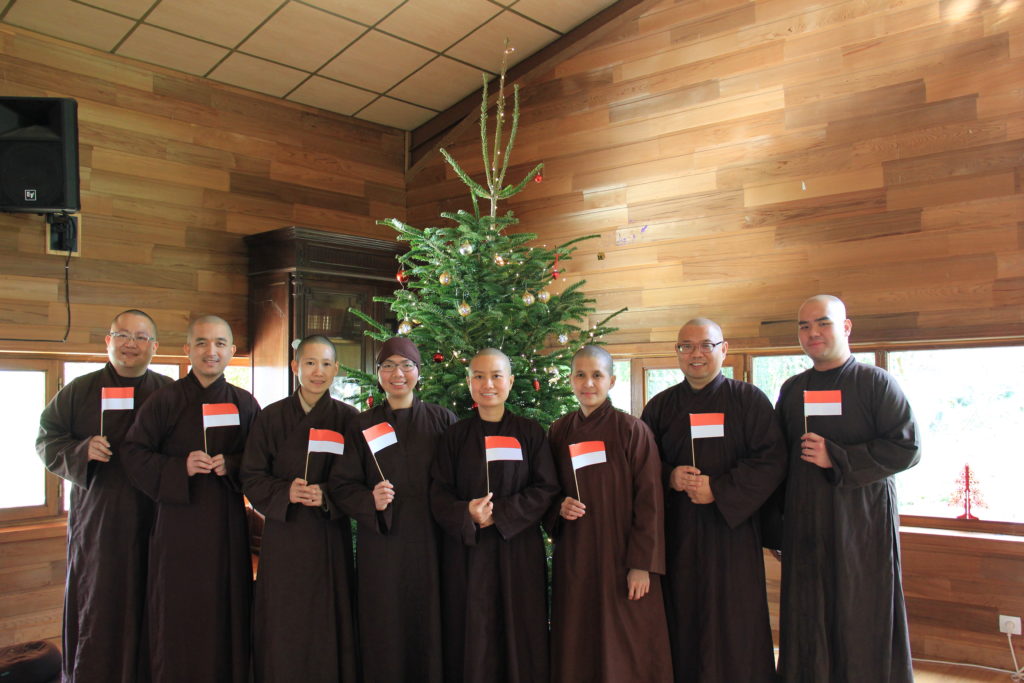
One time, Thay watched the monks and nuns played soccer on a beach. Thay said, “[Soccer] joyful, but you won’t change the suffering. The suffering is still there.” When I heard this story, I began to understand the meaning of play in the light of Thay’s teachings. I see play as a tool to generate joy and happiness, the fifth and sixth exercise of the 16 Mindful Breathing Exercises. But it won’t help us to practice to transform the suffering. We do need joy and happiness before starting to embrace our suffering, as Thay has often taught us.
I see play as one of the Dharma doors Thay has made as a part of renewing Buddhism. The first question of the “Reflection on the Practice” on practice element is “Which of Thay’s Dharma doors are most effective for you?” My answer is play! If I didn’t see the joy and playfulness of the Plum Village monastics, I wouldn’t be here. Play helps me to enter the door of the monastic life, and the practice can be fun and doesn’t have to be serious. As a new Dharma door, sometimes I see that play can be misunderstood by some people. The same is true with laziness. I’ve been interested in exploring more Thay’s teachings on play and laziness to understand them correctly. Perhaps many of my reflection here are not correct, because I still have a lot of wrong perceptions I need to transform. I need support and guidance from my brothers and sisters on the path to understand more of Thay’s teachings.
Play helps me to enter the door of the monastic life, and the practice can be fun and doesn’t have to be serious.
One time, Thay was asked, “How can the Western sisters and brothers be closer to each other like the Vietnamese sisters and brothers?” Thay answered, “It’s not about Western sisters and brothers. But also I think one other reason why other person can be closer to each other is because they like to play. So that I suggest that Western brothers and sisters need to play a little bit more, and be more relaxed. Because you think that playing like that is not a practice physically. So that’s why you don’t play. But technically play is a good Dharma door. So then you should organize to play more. Practicing sitting is also a play. You should not be too serious. You should play more.”
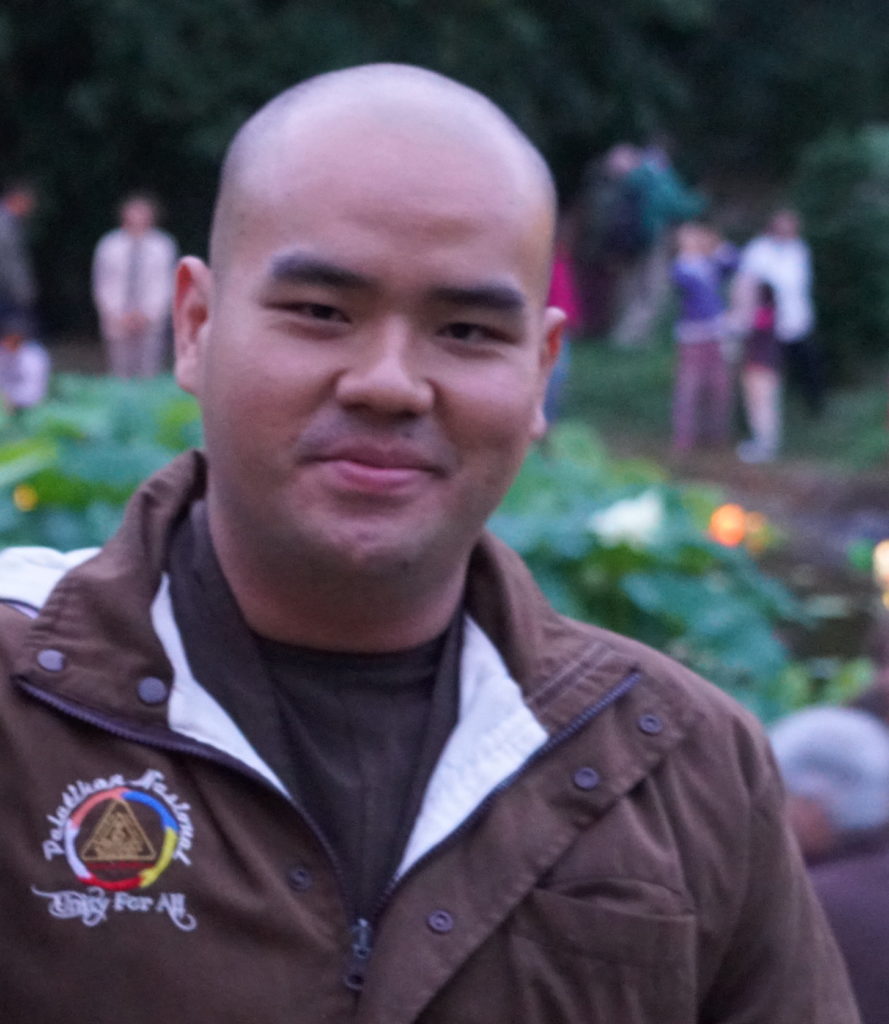
One of my Indonesian brothers used to say, “Don’t be naughty” before he left Plum Village for a retreat or home visit as a message that usually parents, older brothers, or sisters say before they leave home. When he moved to the other monastery, he said to me “Please be naughty!” I see this message as an encouragement for me to be more playful and joyful. Then I sent a message to him telling him that I’m doing well, and I’m becoming more naughty. If you don’t believe me, you can ask another brother who got the same message from him. As a baby monk, I enjoy my time to play and from time to time I ask my brothers, “Let’s di choi!”

